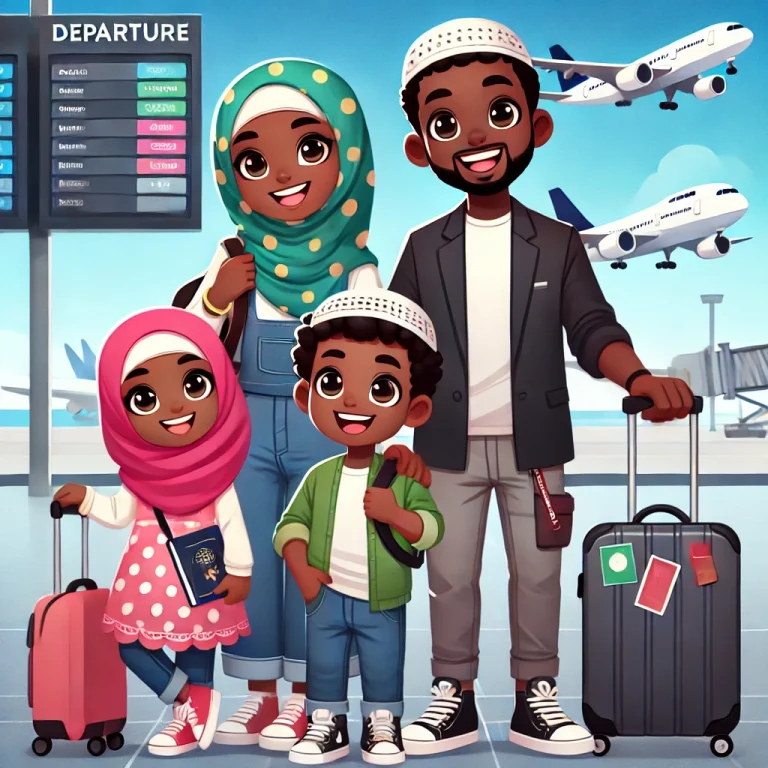Families often move abroad seeking better opportunities, improved quality of life, and financial stability. The decision to relocate isn’t merely about earning more; it’s about eating healthier, dressing better, owning a home, driving nicer cars, and giving children the best possible start in life.

The term Japa originates from Yoruba Language (the main language in Southwestern Nigeria), meaning “to run.” According to the Oxford English Dictionary:
It refers to leaving Nigeria, especially for countries like Europe or North America, in search of education, employment, or economic opportunity.
In recent years, Japa has gained popularity as more families make the leap to pursue a better future.
Moving abroad as a family, however, comes with challenges. Below, we explore these challenges and provide practical solutions.
Table of Contents
ToggleAdjusting to a New Way of Life
Relocating to a foreign country often means adapting to a completely new culture, mannerisms, and behaviours of the host community. For example, a casual greeting in one culture might be considered intrusive in another.
Solution: Learn as much as possible about your new country’s culture before moving. Watch documentaries, follow local influencers, and read online forums. Engage with local communities after you arrive and adopt their positive practices without losing your own cultural identity.
Adapting to Diversity
In countries like Nigeria, most people encounter individuals of similar ethnicities and backgrounds. In contrast, moving to diverse nations like the UK, the US, or Canada means interacting with people of different ethnicities, religions, and perspectives. Your children will likely have classmates from various cultural backgrounds, and you may work alongside colleagues with unique worldviews.
Solution: Embrace diversity by teaching yourself and your family about inclusivity and mutual respect. Encourage your children to appreciate different cultures while holding onto their own values. Attending multicultural events or community activities can also help foster understanding and friendships.
Navigating New Laws
Laws in Western countries can differ greatly from those in developing nations. For instance, the UK has strict regulations on child supervision and corporal punishment (physical reprimand). Immigrant parents unfamiliar with these laws may inadvertently face legal issues.
Solution: Research the legal system of your destination before moving. Websites like GOV.UK offer detailed guidelines for new immigrants. Talk to friends and family already living there and attend local immigrant orientation programs. Seeking advice from local community leaders or cultural groups can also be beneficial.
Coping with Weather Changes
The weather in many Western countries, especially during winter, can be harsh and challenging. Temperatures often drop below freezing, which can lead to health issues such as cardiovascular problems for those unprepared.
Solution: Invest in weather-appropriate clothing early. Purchase thermal wear such as gloves, inner shirts, and thermal trousers. Speak to seasoned immigrants for practical tips on keeping warm. Consider preparing your home with adequate heating systems and insulating windows.
Reduced Societal Support
Relocating often means leaving behind the extended family network that provides support, especially in times of need. Immigrants frequently rely solely on their nuclear family, which can be challenging, particularly after the birth of a child.
Solution: Seek out cities with established cultural or religious communities. Build new networks by attending social events, joining faith groups, or participating in community activities. Supporting each other within immigrant communities can recreate the sense of belonging and assistance that extended families typically provide.
Loneliness
For single people or those relocating without their spouses, loneliness can be a significant challenge. Being in an unfamiliar environment without the comforting presence of loved ones can take a toll on mental and emotional well-being, making it harder to adapt to the new setting.

Solution: Stay connected to loved ones in your home country through various virtual platforms, such as video calls and messaging apps. Additionally, make an effort to build meaningful relationships in your host country. Seek out communities, social groups, or religious organisations that align with your values. With persistence, you will find like-minded individuals who can become a supportive network in your new environment.
If you’re seeking a spouse, consider joining platforms like Quluub, which are designed to connect muslims with shared values and goals, making it easier to find a life partner who aligns with your beliefs and aspirations.
Adapting to Food Differences
Food can be a significant adjustment for immigrants. While stores in countries like the UK stock international products, the availability and taste of homegrown ingredients can vary. Many immigrants must rely on foreign equivalents for their native dishes.
Solution: Locate stores that sell food items from your home country. Join immigrant groups online or in person to share tips on sourcing ingredients. When possible, ask visitors from your home country to bring specific items. Learning to cook with local alternatives can also be a rewarding experience.
Language Barriers
Language barriers can be a significant hurdle when moving abroad, especially to a country where English is not the primary language or where accents and slang differ from what you are accustomed to. Misunderstandings can occur in workplaces, schools, or even during daily interactions, making it harder to integrate socially and professionally.
Solution: Begin learning the local language or dialect before your move. Online resources like Duolingo or language tutors can be invaluable. Additionally, immerse yourself in the new language through the news, books, and conversations with native speakers. Once you arrive, join language classes or community programs that focus on language acquisition. Many countries also have translation and interpretation services to assist immigrants in navigating essential services.
Maintaining Religious Values
Western societies often have low levels of religiosity, which can be concerning for parents wishing to maintain their family’s faith. Adults with strong religious convictions may remain steadfast, but children are more impressionable and may be influenced by their environment.
Solution: Consider homeschooling during the primary years if you can. Many areas have homeschooling communities that can provide guidance and resources. If homeschooling isn’t feasible, enrol your children in faith-based schools, even if they are private. This investment can ensure your children grow up with a strong foundation in their faith.
Final Thoughts
Moving abroad as a family is a life-changing decision that comes with unique opportunities and challenges. Proper planning, research, and a willingness to adapt can ease the transition and make the experience fulfilling. However, it’s equally important to assess if relocation is truly the right decision or whether a different country—or even staying in your home country—might be more suitable for your family’s needs.
By understanding these dynamics and preparing adequately, you can ensure your move is a positive and enriching experience for everyone involved.
